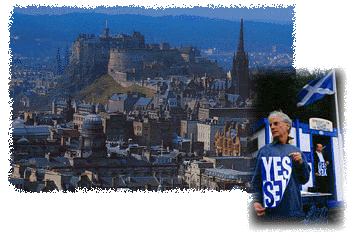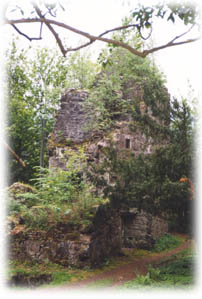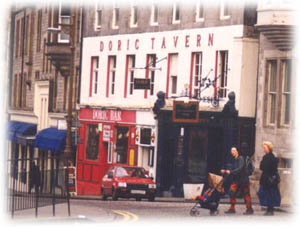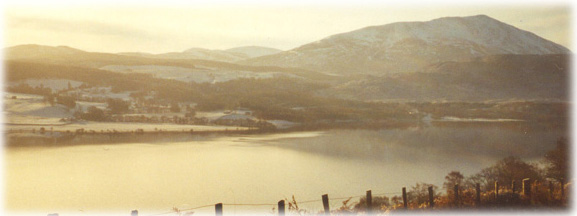 SCOTLAND: SCOTLAND:
NATIONAL
IDENTITY
&
THE POLITICS OF CULTURE
Center
for Global Education,
George
Mason University
News! Scholarships
may be available!
Contact
CGE for information
21
June - 7 July, 2001
3
Credits: ENGL 496/513,
NCLC
495, or may be audited
Open
to the George Mason community, students from other institutions
&
the general public
Registration
Info/Return to CGE Artists
& Lecturers Itinerary
Syllabus Related
Links
Academic
Directors:
Reading
List Undergraduate Requirements
Graduate Requirements MFA
Students
Whether
you want to study Scottish literature, understand the influence of nationalism
on  business
and politics in the EU, or just enlarge your knowledge of a fascinating
nation, thisfifteen-day course will introduce you to the changing, the
enduring, and the contested in Scottish culture. business
and politics in the EU, or just enlarge your knowledge of a fascinating
nation, thisfifteen-day course will introduce you to the changing, the
enduring, and the contested in Scottish culture.
 Our
format will include site visits, lectures, public and private performances,
and group discussions, and you will meet some of Scotland’s leading poets,
musicians, playwrights and scholars, as well as representatives of political
parties. Our
format will include site visits, lectures, public and private performances,
and group discussions, and you will meet some of Scotland’s leading poets,
musicians, playwrights and scholars, as well as representatives of political
parties.
Excursions
will include museums, galleries, castles, kirks, tenement museums, a housing
estate, an underground medieval street, and a chapel where bodies of Reformation
martyrs were prepared for burial. You will also tour the Trossachs area
of the central Highlands, where the history and legend of Rob Roy
is heavily promoted in one of Scotland's most beautiful landscapes. There,
you'll visit the shores of Loch Lomand, take a cruise on Loch Katrine (scene
of Scott’s The Lady of the Lake), and, weather permitting, walk
to Rob Roy’s birthplace.
Some
Questions the Course Will Address
*How
did Scotland become the quintessentially Romantic nation? What was the
character of the
nation before Romanticism remade it? To what extent is contemporary Scotland
embracing, celebrating, or trying to live down that romantic image and
heritage? the
nation before Romanticism remade it? To what extent is contemporary Scotland
embracing, celebrating, or trying to live down that romantic image and
heritage?
*Why
is the creation and consumption of the arts in Scotland always so political?
Why is the issue
of Scotland’s languages -- who speaks what language where -- so contentious?
What
constitutes
traditional music or Scottish theatre? Why are folk, popular and high arts
so intertwined?
*What
forces contributed to the recent successful vote in favor of devolution
and the re-creation, after nearly three hundred years, of an independent
Scottish Parliament? How does contemporary Scottish nationalism help us
understand the resurgent ‘new’ nationalisms reshaping the politics and
economies of the European Union?
 *How
are technology and global mobility altering life in this “microchip of
a nation”? Who’s making
money? Who’s on the dole? Are stable nation-states of the twentieth century,
like Great Britain, a thing of the past? *How
are technology and global mobility altering life in this “microchip of
a nation”? Who’s making
money? Who’s on the dole? Are stable nation-states of the twentieth century,
like Great Britain, a thing of the past?
*What
are the multiple cultures that are creating 21st century Scotland? How
are poets, singers, playwrights, historians, film-makers and popular novelists
helping to create a ‘new Scotland’while defending the cultures of the old?
Itinerary:
June
21: Arrive, orientation
June
22-25: Edinburgh
June
26-27: Perth
June
28-29: Central Highlands
June
30-July 2: Glasgow
July
3-6: Edinburgh
July
7: Depart
|
Reading
List Undergraduate Requirements
Graduate Requirements MFA
Students

Requirements
- Undergraduate Students
Research
Paper 40%
After
returning from Scotland, you will complete a 15-page paper on an approved
topic.
You will meet with an instructor prior to departure and again near the
end of the trip to
discuss
possible topics. Papers will be due approximately two weeks after we return
from
Scotland.
Creative
Project 15%
You
will complete a creative project designed in consultation with an instructor.
Examples might include a sketchbook, a display of photographs, a video,
a web site, a portfolio of poems, a creative essay, or a recording. Projects
must be designed to do more than illustrate places visited; they must provide
a means of integrating or extending what you have learned. Each project
will be accompanied by an introduction placing it in relation to other
aspects of the course. Projects may be begun during the trip and will be
due approximately two weeks after we return from Scotland.
Journal
15%
You
will use your journal daily to take notes at lectures and from reading,
record information
from
other sources, draw connections among various aspects of the course, and
reflect on your own experiences. Responses to specific questions or problems
may also be required.
Participation
15%
The
success of a study tour depends on student participation and input. Therefore,
you are
expected
to take part in all scheduled events.
Oral
Presentation 15%
During
the last two days of the trip each of you will make a 20 minute presentation
to the group on a topic of your choice.
Except
in extraordinary circumstances, no Incomplete grades will be given.
Related Links
Reading
List Undergraduate Requirements
Graduate Requirements MFA
Students

Requirements
- Graduate Students in Academic Degree Programs
Research
Paper 50%
You
will complete a 20-25 page paper on a topic appropriate to your program
of study. You will meet with an instructor prior to departure and again
near the end of the trip to discuss possible topics. Papers will be due
approximately three weeks after we return from Scotland.
Creative
Project 10%
You
will complete a creative project designed in consultation with an instructor.
Examples might include a sketchbook, a display of photographs, a video,
a web site, a collage, a portfolio of poems, a creative essay, or a recording.
Projects must be designed to do more than illustrate places visited; they
must provide a means of integrating or extending what you have learned.
Each project will be accompanied by an introduction placing it in relation
to other aspects of the course. Projects may be begun during the trip and
will be due approximately three weeks after we return from Scotland.
Journal
15%
You
will use your journal daily to take notes at lectures and from reading,
record information
from
other sources, draw connections among various aspects of the course, and
reflect on your own experiences. Responses to specific questions or problems
may also be required.
Participation
15%
The
success of a study tour depends on student participation and input. Therefore,
you are
expected
to take part in scheduled events. If your paper topic requires research
in a Scottish
library,
you may be excused from some activities. However, you must inform an instructor
of
your
plans and receive permission to be absent.
Oral
Presentation 10%
During
the last two days of the trip each of you will make a 20 minute presentation
to the group on a topic of your choice.
Except
in extraordinary circumstances, no Incomplete grades will be given.
Related
Links
Reading
List Undergraduate Requirements
Graduate Requirements MFA
Students

Requirements
-- Graduate Students in the MFA Program
Candidates
for the MFA may elect to change the relative weight of the research paper
and
creative
project. Your creative project must then be reconceived to reach professional
standards. To take this option, you must consult with Susan Tichy and submit
a proposal in writing no later than July 5 (our next-to-last day
in Scotland). All other requirements will be the same as for graduate students
in academic degrees. If you wish to include one or more Scottish poets
on your MFA exam list you may continue the reading begun here through a
Directed Reading with Susan Tichy for Fall 2001.
Registration
Info/Return to CGE Related
Links Return to Top
Reading
List Undergraduate Requirements
Graduate Requirements MFA
Students
Faculty:
Associate Professor Susan Tichy has taught in George Mason’s Graduate
Writing Program (MFA Poetry) since 1988. She also teaches modern poetry
and has a special interest in Scottish poetry and the Scottish traditional
ballad.
An eclectic traveler, Tichy has also published poetry resulting from time
spent in Israel and the Philippines. Her first book, The Hands in Exile,
based on several months spent working on the Golan Heights, was selected
for the National Poetry Series in 1982. Her second, A Smell of Burning
Starts the Day, resulted from research into human rights abuse in the
Philippines during the Marcos years and during the Philippine-American
War of 1899-1902.
Tichy’s current work, Trafficke: An Autobiography, maps a family
history from the Scottish Highlands to the origins of slavery in early
Maryland. Excerpts have appeared or are forthcoming in The Literary
Review, Quarter After Eight, Green Mountains Review,
Indiana
Review, & Phoebe. Other poetry has recently appeared in
the Scottish journal
Chapman.
When not teaching, she lives in a ghost town in the Colorado Rockies. |
Lesley Smith was born in Edinburgh, Scotland. She studied history at
the universities of St. Andrews and Oxford, where she gained her doctorate
in Modern History. After ten years working as a researcher and producer
in British network television, she moved to the US and worked as a freelance
video producer and scriptwriter before returning to academic life as a
student in George Mason's Graduate Writing Program (MFA Poetry),
from which she graduated in 1998.
While studying in that program she fell in love with the computer screen
as a writing space, and taught several courses for the English Department
and New Century College which involved the reading and writing of hypertext
and hypermedia. She now works as Assistant Professor of Computer-Mediated
Communication in New Century College.
Dr. Smith has edited five collections of essays on British history, reviews
movies and television for the online popular culture journal, popmatters.com,
and is currently working on a hypertext poetry sequence investigating the
multiple public, cultural and private histories embedded in a single family's
experience of the twentieth century. |
Reading
List Undergraduate Requirements
Graduate Requirements MFA
Students
Registration
Info/Return to CGE Artists
& Lecturers Itinerary
Syllabus Related
Links
Return
to Top Return
to Susan Tichy's Main Page
|
 SCOTLAND:
SCOTLAND:
 business
and politics in the EU, or just enlarge your knowledge of a fascinating
nation, thisfifteen-day course will introduce you to the changing, the
enduring, and the contested in Scottish culture.
business
and politics in the EU, or just enlarge your knowledge of a fascinating
nation, thisfifteen-day course will introduce you to the changing, the
enduring, and the contested in Scottish culture.

 Our
format will include site visits, lectures, public and private performances,
and group discussions, and you will meet some of Scotland’s leading poets,
musicians, playwrights and scholars, as well as representatives of political
parties.
Our
format will include site visits, lectures, public and private performances,
and group discussions, and you will meet some of Scotland’s leading poets,
musicians, playwrights and scholars, as well as representatives of political
parties.
 the
nation before Romanticism remade it? To what extent is contemporary Scotland
embracing, celebrating, or trying to live down that romantic image and
heritage?
the
nation before Romanticism remade it? To what extent is contemporary Scotland
embracing, celebrating, or trying to live down that romantic image and
heritage?
 *How
are technology and global mobility altering life in this “microchip of
a nation”? Who’s making
money? Who’s on the dole? Are stable nation-states of the twentieth century,
like Great Britain, a thing of the past?
*How
are technology and global mobility altering life in this “microchip of
a nation”? Who’s making
money? Who’s on the dole? Are stable nation-states of the twentieth century,
like Great Britain, a thing of the past?

